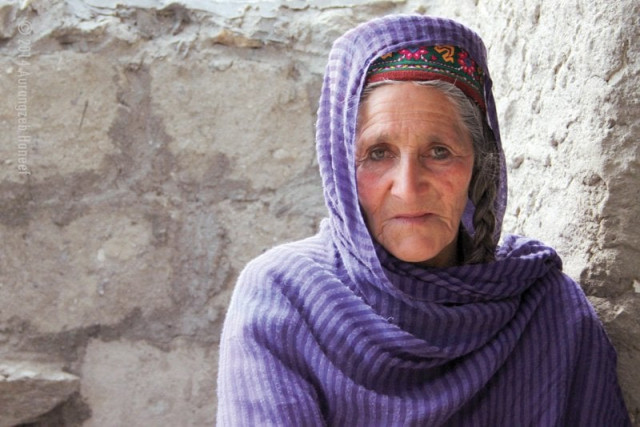Local threads: Saving embroidery one stitch at a time in Hunza
This 79-year-old has been making embroidered items since she was 10.

The continued existence of the traditional art of embroidery in Gilgit-Baltistan (G-B) can be attributed to people like 79-year-old Shukrat Bibi who has dedicated her life to conserving the craft.
Bibi’s nimble fingers took to the art of stitching at the tender age of 10. The resident of Karimabad town of Hunza Valley had learnt from the best – her mother. Over the next seven decades, the artisan passed on the skill as she trained hundreds of women and helped them become financially independent or providers for their families.
In 1992, she was awarded the prestigious Presidential Pride of Performance Award for keeping the delicate art of do sutti karhai alive in the region.
“The needlework I do today is all because of my mother who taught me,” Bibi expresses her gratitude while talking to The Express Tribune.
Sitting in her small shop situated close to Baltit Fort, Bibi looks at home among her wares which include traditional caps, embroidered wallets and colourful women’s dresses.

In 1992, Bibi was awarded the prestigious Presidential Pride of Performance Award for keeping the delicate art of do sutti karhai alive in the region. PHOTOS: AURANGZEB HANEEF/EXPRESS
“I don’t remember the exact number of women I have trained over the years. But I know for a fact that the number is in the hundreds,” she says proudly.
Her products are available for a variety of prices, ranging from Rs200 to Rs1,500, depending on the work. However, Bibi says the profit she makes falls short of what her family actually needs to make ends meet.
Her husband Niyat Shah is a retired soldier and his monthly pension is Rs5,700. The average income Bibi earns from her shop is a meagre Rs4,000 per month. Even though the couple does not have children, their expenditures are higher than their income.
Unfortunately for Bibi, she isn’t aware of organisations such as the All Pakistan Women’s Association (APWA) which work for the economic welfare of women.
“There is a possibility that we may look into options to assist women like Shukrat Bibi,” says Durre Shawar of APWA. “We can even put her products on display at our events,” said Shawar who is based in Lahore.
But for Shukrat Bibi, her work is gradually becoming more hectic and less fun to do. Security concerns have affected the tourism industry and taken away prospective customers. However, what really hinders her in the expansion of her business is her declining health and her inability to communicate in any other language except her native tongue, Burushaski.

“I have done whatever I could to keep the art of embroidery alive. Now it is up to the youth to keep the needles going,” she says.
Lost incomes
In Hunza Valley, embroidery has become a source of extra income for hundreds of women, who make the products at home and at sell them in local markets.
A number of non-governmental organisations, including Karakoram Area Development Organization, have implemented projects to boost sales of locally-made handicrafts. Carpets and traditional goat or yak hair rugs (Sharma) are some of the products that reflect the craftsmanship of the residents of a valley that once was a tourist hub.
“Gone are the days when tourists would flock to this region and buy our products at reasonable prices,” says Nadir Shah, a businessman who runs a shop called Hunza Art Museum in Karimabad.
The tourism industry suffered a major blow after the September 11, 2001 attacks on the twin towers in New York, US, while the brutal killing of 10 foreigners at the foot of Nanga Parbat last year served as the final nail in the industry’s coffin, leaving more than 5,000 families jobless in G-B.
Published in The Express Tribune, June 19th, 2014.


















COMMENTS
Comments are moderated and generally will be posted if they are on-topic and not abusive.
For more information, please see our Comments FAQ